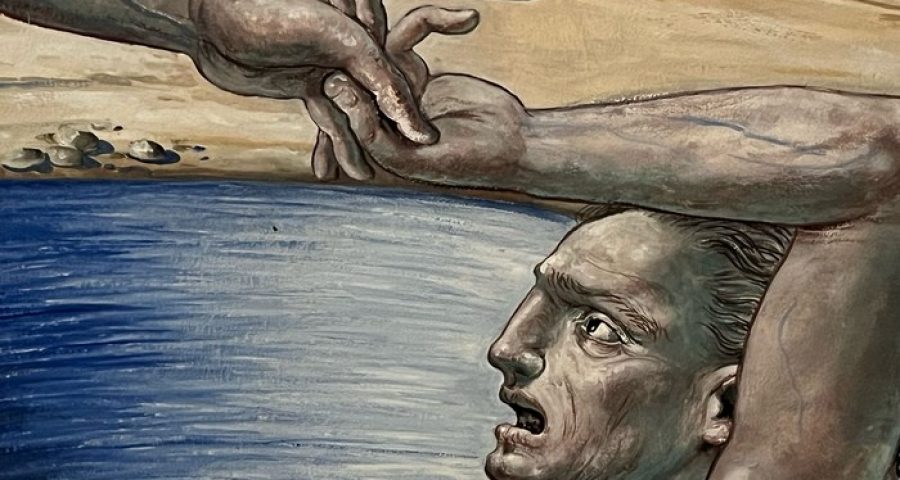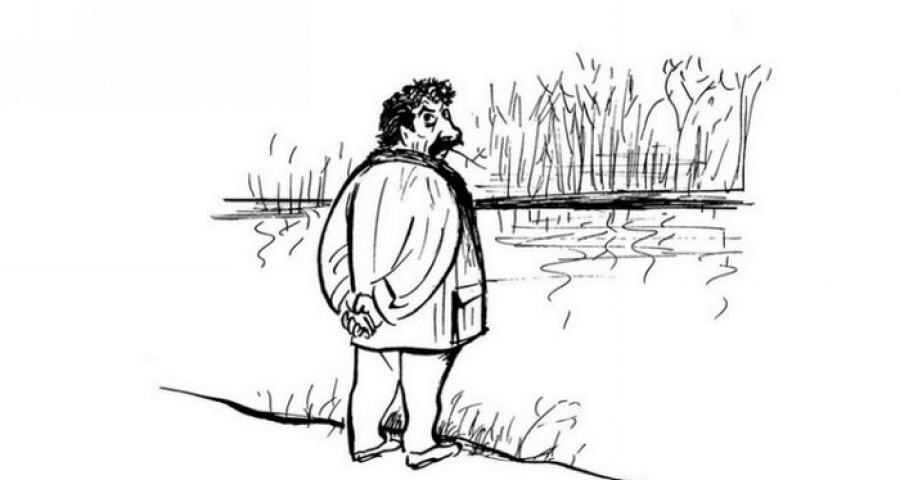In the belly of the Word/10 - Jonah's last words brought a new vocabulary into the relationship
by Luigino Bruni
published in Avvenire on 21/04/2024
"Among the various realities present before creation, in addition to the Torah there is repentance. How could there be repentance before sin? In the Bible, even God repented, and he certainly had not sinned. Repentance is something that man keeps with him, as you keep medicine at home even if you are not sick."
Paolo de Benedetti, In his image, Morcelliana
Jonah is the most underrated and misunderstood prophet in the Bible and ancient religious literature. In this series we are trying, tenaciously, to take him seriously, so as not to dismiss his central dramatic passages by relegating them to fairy tale or humour. As if fabulous elements were not present throughout the Bible and humour was not one of the biblical languages for communicating deep and difficult truths that would not be understood if they were communicated in the form of theological theorems. Because in the Bible, and in life, fairy tales and humour are ways (‘methods’) to lightly express heavy and painful realities, to tame them, to ‘create bonds' and thus allow them to be accommodated as good guests inside the house. The whole Bible, not only the Old Testament, requires a constant practice of hermeneutics, inviting us in every line to decipher its messages hidden within metaphors, allegories, parables and dreams; to leap over two millennia and still dialogue with those men who are ancient and yet contemporary. And if because of its literary genre we devalue Jonah, we must do the same with the fratricide of Cain, with the binding of Isaac, with the vocation of Ezekiel and finally with the empty tomb. Jonah’s castor plant (qiqajon) is not substantially different from the angel Gabriel of Luke's gospel and the ‘sign of Jonah’ and the ‘sign of Golgotha’ could be the same sign, teaching us (almost) the same thing. The stories of the Bible are good news covered in their literary genre, a dress that enriches them and makes them more beautiful although it is the only dress available in the wardrobe. Because the biblical texts are words, and the word is the ‘house' of being, it is not being itself, which therefore remains veiled in its intimacy. Thus the whole Bible is a metaphor, because it is all speech; and the day we forget the veil of the word that veils and unveils God we will have made the Bible the perfect idol and we will have become mere idolatrous consumers of vanities. To trivialize Jonah’s messages means to trivialize the entire Bible and all humanism based on it, to ridicule Dante and Michelangelo, Leopardi and Dostoyeskji, Marc Chagall and Leonard Cohen.
"But when dawn came up the next day, God appointed a worm that attacked the bush, so that it withered. When the sun rose, God prepared a sultry east wind, and the sun beat down on the head of Jonah so that he was faint and asked that he might die. He said, “It is better for me to die than to live.”" (Jonah 4:7-8). Another heaven-earth dialogue introduced by another but - in the book of Jonah the adversarial propositions are co-protagonists of the story.
Many interpreters and readers have laughed and still laugh in the face of this new bizarre anger of Jonah, trapped within their literary genre, they did not enter into the mystery of this book. Because if Jonah had truly believed that that tree was a message of life for him, then in that sudden and unexpected growth of the plant he had truly glimpsed the beginning of a new physical, spiritual and vocational spring. When the worm and the scorching wind dried up the castor oil plant and affected Jonah, the prophet fell back into the spiritual depression from which that plant had pulled him out.
To the prophets, fleeting joys, those small happiness’s that make the yoke of life possible and sweet for almost all of us, mean nothing if they are not inserted within a ‘forever’. Without the prophets we would not even understand the meaning of ‘forever’ and in fact we are losing it. If today God sends relief and tomorrow he takes it away, the tree that dies today also erases the joy of its nourishment yesterday. This is the fragility of the prophet, this is also their preciousness.
In reality, when in days of pain we remember past happy days, we too tend to overshadow yesterday's joy with today's sadness. But for us there is also the feeling that goes in the opposite direction, when the living memory of those who are no longer with us reduces our sadness a little, if we believe that the joy of yesterday was real although fleeting. The living memory of a person, an event or an emotion can also be a strange form of happiness and we can nourish ourselves for a long time on its unleavened bread.
This often applies to us but not to the prophets. For them, memory does not play a good role. They live in an eternal present and if today's word belies yesterday's, the new word takes all the joy and consolations with it. There is nothing left and if there is anything left, it only increases the pain. That plant that grew one day and dried up the next was therefore a devastating experience for a prophet. Also because they cannot even resort to another resource that is available to all other men and women. When faced with a sad present that cancels out a happy past, we say: ‘let's hope that tomorrow brings a nice surprise that will overcome today's sadness’. This natural resource, this first cousin of hope, is not part of the repertoire of the prophet, who believes in the word they receive when he receives it, without past or future; he must believe it, because if he was to question that word that comes to him now hoping that another ‘truer’ one will come soon to nullify it, he would deny the truth of the word and therefore the nature of his vocation. The prophet is all present and in this too he resembles God, as a word nailed down on that day, now and forever.
So we should not be surprised at how that dialogue continued: "But God said to Jonah, “Is it right for you to be angry about the bush?” And he said, “Yes, angry enough to die” (4:9) God renewed the same question to Jonah (‘Is it right for you...?’) that he had asked to him as a result of his anger aroused by the forgiveness of Nineveh (4:4). And this time Jonah answered the question explicitly, spoke and said: yes it is right. Jonah was really very sad and angry, even more than the first time: he was an angry prophet, doubly disappointed, his first disappointment was amplified and the ancient pain was sharpened. Jonah had truly believed in the truth of the sign of plant and so in order not to deny the truth of yesterday's word alongside the new word he had only one possible move: he had to be angry with God. In great crises, we might not lose faith if we can turn pain and anger into a quarrel with God. The prophet's indignation holds together yesterday's truth with the opposite truth of today.
These were the last words of Jonah in the book - only God's with last words remain which we will see next week. An unusual way of ending a vocation, of concluding a vocational story, of finishing a human story. Unusual and bizarre for us, not for the Bible.
In fact, if we talk with the true prophets and really listen to them - there are many of them even today - if we study the prophets in the Bible and in life, we realize that Jonah’s end is much more common than those who do not know the prophets think. False prophets are men and women who end their story in success and applause. The sincere and authentic prophet does not control the end of his story; as long as he lives he cannot know how that special and vital dialogue in which he has grown since youth will end. He only knows the present and ignorance of the future – his own and God's - also becomes ignorance of the end of his story and his life. Moses had spoken mouth-to-mouth with YHWH throughout the journey of the exodus and ended his life alone, outside the Promised Land and perhaps also angry. Jeremiah's last days were days of desolation, marked by the silence of the word. Ezekiel ended his life in exile and as a widow, Hosea was not reunited with his unfaithful wife, Jesus ended his earthly experience nailed to a why?’ addressed to the Father.
So finishing your task like Jonah is not a bad ending. To be able to quarrel with God is one of the highest ethical and spiritual legacies of the Bible, because it really expresses the dignity of men and women, it is a demonstration of the truth of Psalm 8: “… and yet you have made them a little lower than God”. We are ‘a little lower’ than God in many things: when we truly forgive, when we learn to die meekly or when we rise from abandonment and mourning and also when we are able to quarrel with God.
Jonah's prophetic quarrel is wonderful because it is extreme, and the humorous literary genre only increases this radicalness. His book ends with a dissonance similar to the disobedience with which it opened. The Bible loves dialogues, all dialogues, and therefore it loves agreements and disagreements, harmonies and disagreements, it loves ‘yes’s’ very much and it also loves ‘no’s’. Because the biblical God treats us as daughters and sons, as partners, so he also accepts the literary genre of quarrel - only slaves and servants cannot quarrel with their masters.
So Jonah's last words of anger and outrage not only make us infinitely and definitely sympathetic and friendly to that ancient prophet but have introduced into the vocabulary that we can use to talk to God also our words of outrage, our anger, and our disagreements with God. It has widened the horizon of the human friend of the Bible. It’s truly very beautiful.
Every day, many men and women speak with God using words of praise and thanksgiving, of love and tenderness; but other men and other women - perhaps the majority - speak with the same God using words of anger, for a dead child, for a granddaughter who has lost her way, for the awareness of having wasted the best years in pursuit of illusions and many end their existence with these words of quarrel on their lips, which become the only words with which they welcome the angel of death and perhaps there are no better ones, because that quarrel becomes the rope that saved our wounded faith and kept us tied to the soul of our soul until the end: in Latin fides means rope and faith. The story of Jonah tells us that there is also a place in the Bible for this vocabulary which is not very nice or respectable but which is profoundly human. We are also an image of God because of our ability to be angry with Elohim. There are many more true prayers on earth than we think.













